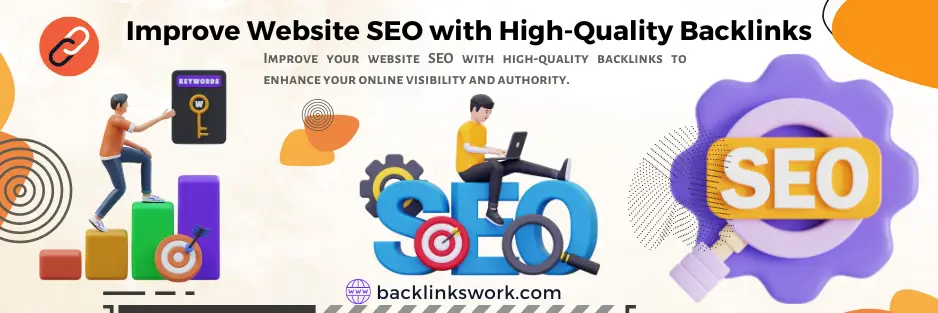In today’s digital world, improve website SEO with high-quality backlinks is essential for success. Having a website is only the first step. Getting your website noticed by search engines and ranking higher than your competitors is the real challenge. One of the most effective ways to boost your website’s SEO is through high-quality backlinks.
In this blog, we’ll explore how high-quality backlinks can improve your website’s SEO and how to get them.
What Are Backlinks?
Backlinks are simply links from one website to another. When a website links to your site, it’s called a backlink. Think of it as a vote of confidence—a way for search engines like Google to see that other sites trust your content.
But not all backlinks are created equal. High-quality backlinks come from authoritative, relevant websites. These are the links that truly make a difference to your SEO and rankings.
Why Are Backlinks Important for SEO?
Backlinks are considered one of the top-ranking factors by search engines. Here’s why they’re so important:
- Search Engine Trust: Search engines like Google use backlinks as a signal of trust. If many high-quality sites are linking to yours, it tells Google that your content is valuable.
- Authority Building: When your website is linked to by other respected sites, it increases your domain authority, helping your site rank higher in search results.
- Referral Traffic: Backlinks not only improve SEO but can also send traffic directly to your site from other sites. This helps in increasing exposure, leads, and conversions.
- Faster Indexing: Backlinks help search engines find your pages faster. The more high-quality backlinks you have, the more likely your site will be crawled and indexed quickly.
What Makes a Backlink “High-Quality”?
To improve your website’s SEO, it’s essential to focus on high-quality backlinks. Here are some characteristics that define a high-quality backlink:
- Relevance: The linking site should be relevant to your industry or content. For example, if you run a fitness blog, a backlink from a health-related site is more valuable than one from a cooking blog.
- Authority: Links from high-authority sites (like established news outlets or industry leaders) carry more weight than those from low-authority sites. Tools like Moz or Ahrefs can help you check the authority of sites linking to you.
- Anchor Text: The clickable text in a link (anchor text) should be relevant and descriptive. Keywords in the anchor text can signal to search engines what the linked page is about, but avoid over-optimization.
- Natural Placement: High-quality backlinks are placed within relevant content—not in the footer or as part of a spammy link exchange. They should feel natural to the reader and relevant to the topic.
How to Get High-Quality Backlinks
Now that you understand the importance of high-quality backlinks, let’s look at how to get them:
1. Create Shareable Content
One of the best ways to earn high-quality backlinks is to create valuable content that people want to share and reference. This could be:
- Blog Posts: Write informative, well-researched blog posts.
- Infographics: Visual content is highly shareable, especially if it’s packed with useful data.
- Videos: Engaging video content can attract attention and links.
When your content is exceptional, other sites are more likely to link back to it.
2. Guest Posting
Guest posting on authoritative sites in your niche is a proven way to get quality backlinks. Offer to write for well-known blogs, and in return, you can include a link to your own website. Be sure the content is valuable and relevant to their audience so that your link feels natural.
3. Reach Out for Backlinks
Sometimes, all you need to do is ask. If you find a website that’s relevant to your industry, reach out to the webmaster and suggest content they can link to. Be polite and explain how linking to your content would be beneficial to their audience.
4. Fix Broken Links
Search for broken links on relevant websites in your niche. If you find a broken link, you can reach out to the site owner and suggest replacing it with a link to your content. This benefits both parties—they fix a broken link, and you get a backlink.
5. Leverage Social Media
Promote your content on social media platforms to increase its visibility. When more people see and engage with your content, the chances of earning backlinks naturally increase. Bloggers, journalists, and other content creators often find inspiration on social media.
Avoiding Bad Backlinks
Ways to improve website SEO, backlinks are crucial, not all backlinks help. In fact, some can hurt your website’s rankings. These are often called “toxic backlinks”. Here are a few things to avoid:
- Link Farms: These are websites created solely to generate backlinks. Search engines can easily detect these and penalize websites that use them.
- Irrelevant Links: Links from completely unrelated websites or blogs won’t help your SEO and may even harm it.
- Paid Links: Buying links is a violation of Google’s guidelines. While it may give a short-term boost, it can lead to severe penalties in the long run.
It’s essential to monitor your backlink profile regularly to ensure you’re not being linked to by harmful or irrelevant websites.
Conclusion
Ways to improve website SEO, backlinks are a powerful tool in your SEO strategy, but only if they’re high-quality. Focus on earning backlinks from reputable, relevant sources and avoid spammy link-building practices.
By prioritizing high-quality backlinks, you can improve your website’s search engine rankings, drive more traffic, and boost your online authority.
Remember, building a strong backlink profile takes time, so be patient and consistent with your efforts. With persistence and smart tactics, your website will climb higher in the search rankings.




I wanted to take a moment to commend you on the outstanding quality of your blog. Your dedication to excellence is evident in every aspect of your writing. Truly impressive!
Thank you for your kind words!